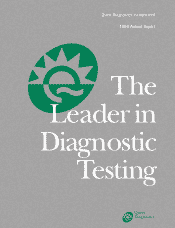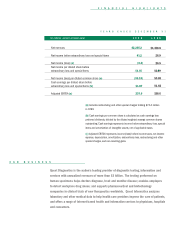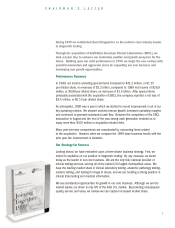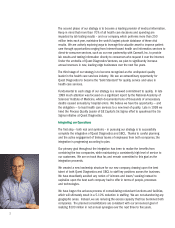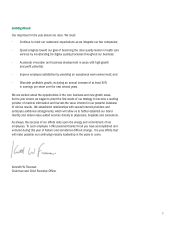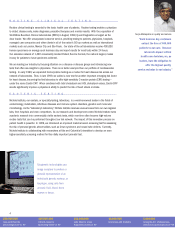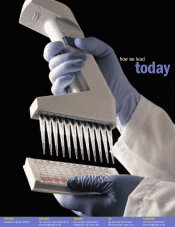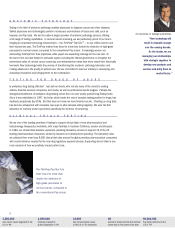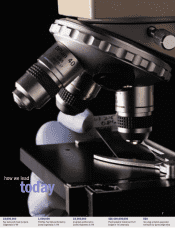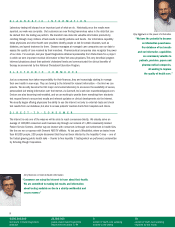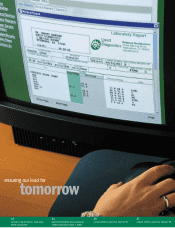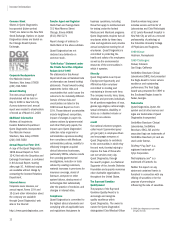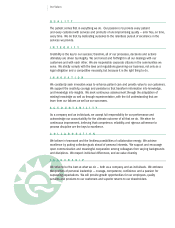Quest Diagnostics 1999 Annual Report Download - page 6
Download and view the complete annual report
Please find page 6 of the 1999 Quest Diagnostics annual report below. You can navigate through the pages in the report by either clicking on the pages listed below, or by using the keyword search tool below to find specific information within the annual report.
ROUTINE CLINICAL TESTING
Routine clinical testing is essential to the basic health care of patients. Routine testing enables a physician
to detect disease early, make diagnoses, prescribe therapies and monitor results. With the acquisition of
SmithKline Beecham Clinical Laboratories (SBCL) in August, 1999, Quest Diagnostics emerged as the
clear leader. We offer unsurpassed customer service, providing testing to patients, physicians, hospitals,
managed care companies and other clients in all of the nation’s 50 top markets as well as international
markets such as London, Mexico City and São Paulo. Our state-of-the-art laboratories receive 400,000
human specimens on average each business day and report results for most tests within 24 hours.
Our extensive network of 1,400 conveniently located Patient Service Centers, the nation’s largest, makes
it easy for patients to have specimens collected.
We are leading our industry by focusing attention on a disease or disease groups and introducing new
tests that offer new insights to physicians. There is no better example than our portfolio of cardiovascular
testing. In early 1999, we expanded homocysteine testing as a marker for heart disease risk across our
network of laboratories. Then, in late 1999, we added a new test for another important emerging risk factor
for heart disease, becoming the first laboratory to offer high-sensitivity C-reactive protein (CRP) testing —
under the name Cardio CRP. When combined with total cholesterol and HDL cholesterol values, Cardio CRP
results significantly improve a physician’s ability to predict the risk of heart attack or stroke.
ESOTERIC TESTING
Nichols Institute, our esoteric, or specialty-testing, laboratory, is a world-renowned leader in the fields of
endocrinology, metabolism, infectious diseases and immune system disorders, genetics and molecular
microbiology. As the “laboratory’s laboratory,” Nichols Institute receives unusual cases from our own regional
labs, from hospitals and even competitors. As our research and development center, Nichols Institute turns
academic research into commercially viable esoteric tests, which over time often become high-volume
routine tests that can be performed throughout our lab network. The impact of this innovation process on
patient health is powerful. In 1999, we introduced an improved maternal serum screening test for assessing
the risk of prenatal genetic abnormalities, such as Down syndrome and neural tube defects. Currently,
Nichols Institute is collaborating with researchers at Yale and Columbia Universities to develop an even
higher-sensitivity screening method for this vitally important prenatal test.
Surya N. Mohapatra, President and Chief Operating Officer: “Each business day, doctors and hospitals
entrust the lives of 400,000 patients to our care. Because lab results impact critical health care decisions,
we, as leaders, have the obligation to offer the highest quality, service and value in
our industry.”
4
“Each business day, customers
entrust the lives of 400,000
patients to our care. Because
lab results impact critical
health care decisions, we, as
leaders, have the obligation to
offer the highest quality,
service and value in our industry.
250,000,000
tests performed by
Quest Diagnostics in ’99
100,000,000
patients tested by
Quest Diagnostics in ’99
160,000,000
miles driven by Quest
Diagnostics couriers in ’99
16,000,000
Americans with diabetes 5,000,000
hemoglobin A1c (diabetes) tests
performed by Quest Diagnostics in ’99
Cytogenetic technologists use
image analyzers to produce a
pictorial representation of an
individual’s genetic makeup, or
karyotype, using cells from
amniotic fluid, blood, bone
marrow or tissue.
Surya Mohapatra on quality and service
”

